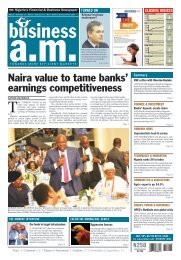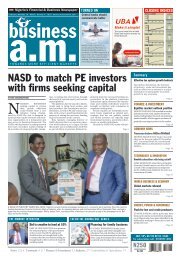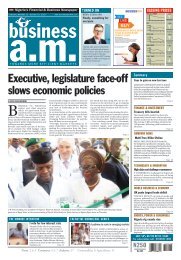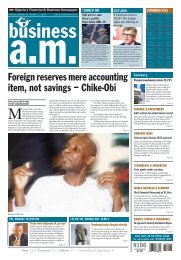Create successful ePaper yourself
Turn your PDF publications into a flip-book with our unique Google optimized e-Paper software.
Zinox set to reposition<br />
e-commerce<br />
in Nigeria,<br />
acquires Konga<br />
for leverage<br />
Tiamiyu Adio<br />
<strong>BUSINESS</strong> A.M. <strong>FEB</strong>RUARY, MONDAY 05 - SUNDAY 11, <strong>2018</strong><br />
Zinox Group, an integrated<br />
information communication<br />
technology (ICT)<br />
solutions conglomerate<br />
and original equipment<br />
manufacturer (OEM), has concluded<br />
the acquisition of e-commerce giant,<br />
Konga in a move that is expected<br />
to raise the profile of e-commerce in<br />
the country, Leo Stan Ekeh, chairman<br />
of Zin ox Group has confirmed<br />
to Business.a.m<br />
Ekeh who spoke top Business.a.m<br />
said the transaction has been approved<br />
by the Securities and Exchange<br />
Commission (SEC).<br />
Analysts say the acquisition is a<br />
major development that could see e-<br />
commerce in Nigeria finally unlock<br />
the massive revenue potential in the<br />
global multi-billion-dollar industry.<br />
The move is also expected to<br />
see Zinox make a bold return to<br />
an industry it pioneered in Nigeria<br />
with the launch of BuyRight<br />
Africa.com which was challenged<br />
by the absence of credit card and<br />
e-payment infrastructure when it<br />
was launched over 12 years ago.<br />
Details of the deal include Zinox<br />
Group, one of Africa’s biggest technology<br />
group assuming ownership<br />
of the e-commerce platform, Konga.<br />
com which remains as one of the<br />
biggest players in the sector.<br />
This development, coming at<br />
a time when global e-commerce<br />
spending is expected to top previously<br />
unheralded levels, is widely<br />
expected to reposition Konga for<br />
a greater share of the e-commerce<br />
purse in Nigeria and beyond.<br />
Also some industry analysts estimated<br />
that the acquisition could<br />
lead to the integration of Konga and<br />
Yudala, which is owned by Ekeh’s<br />
son, to wade off competition and<br />
make it one of biggest e-commerce<br />
companies in Africa.<br />
In 2017, retail e-commerce sales<br />
worldwide amounted to $2.829 trillion<br />
while e-retail revenues are projected<br />
to grow to $4.48 trillion by 2021.<br />
Ekeh explained that the acquisition<br />
was expected to create<br />
employment opportunities for over<br />
750 Nigerians, both at home and<br />
in the Diaspora, saying that many<br />
erstwhile employees of the company<br />
laid off in the restructuring process<br />
may be recalled.<br />
Konga recently announced a shift<br />
to a prepay-only model, essentially<br />
putting a stop to Pay on Delivery<br />
(PoD) – a significant decision which<br />
formed part of an internal restructuring<br />
aimed at putting the business<br />
on a sound footing in the market.<br />
This move, coupled with the<br />
new investment, were expected to<br />
spark an up-turn in the company’s<br />
fortunes which will see Konga assume<br />
a more significant share of the<br />
e-commerce market.<br />
Led by serial digital entrepreneur,<br />
Ekeh, the Zinox Group has<br />
grown from a position of strength to<br />
become one of the biggest names on<br />
the African technology scene.<br />
With its headquarters in Lagos,<br />
Nigeria and branches all over the<br />
country in addition to hubs in Africa,<br />
Asia, Europe and the Middle East;<br />
the Zinox Group boasts a 360-degree<br />
spectrum orientation as an<br />
integrated ICT solutions group with<br />
advanced competencies in manufacturing,<br />
distribution, retail and<br />
after-sales support, among others.<br />
TECHNOLOGY&INNOVATION<br />
23<br />
U.S House enact<br />
bill to enable<br />
consumers set<br />
up account<br />
without visiting<br />
bank branch<br />
Tiamiyu Adio<br />
THE UNITED STATES House of<br />
Representatives recently passed a bill<br />
(HR 1457) that would enable financial<br />
institutions accept personal identification,<br />
such as scan of a drivers<br />
license, to open up on bank account<br />
on a mobile device or computer.<br />
“The financial institution may<br />
use the information for the purpose<br />
of verifying the authenticity<br />
of the driver’s license or identification<br />
card, verifying the identity of<br />
the individual, or complying with<br />
legal requirements,” the bill said.<br />
The bill passed with broad<br />
bipartisan support and has now<br />
been moved over to the Senate for<br />
further discussion.<br />
The fact that legislation is required<br />
to authorize some banks to<br />
accept a digital process for opening<br />
an account is indicative of the fact<br />
that bank branches may quickly<br />
become extinct. Soon enough, bank<br />
branches will experience the same<br />
fate of the Blockbuster entertainment<br />
outlets that once littered strip<br />
malls across the US. The legislation<br />
also highlights the disparate regulations<br />
that exist in the 50 different<br />
states – a fact that is an impediment<br />
to more rapid innovation.<br />
While allowing for ID scans<br />
to be accepted should make it<br />
simpler for some individuals in<br />
opening accounts it is probably<br />
just a temporary measure until<br />
Blockchain based ID verification<br />
takes over – globally.<br />
Lenovo mobile unit drags business as group posts quarterly loss of $289m<br />
CHINESE PERSONAL-COM-<br />
PUTER maker Lenovo Group is<br />
struggling with its mobile business<br />
unit as it reported a net loss<br />
of $289 million for its fiscal third<br />
quarter, after taking a write-off of<br />
$400 million resulting from the<br />
recent US tax reform.<br />
The company has struggled in<br />
recent times to turn around its<br />
loss-making mobile unit amid<br />
tough global competition and<br />
slowing market growth.<br />
Lenovo swallowed a one-time<br />
charge of roughly $400m as a<br />
result of the Trump administration’s<br />
tax overhaul, though it said<br />
the reforms may result in a lower<br />
tax rate for its U.S. operations in<br />
the longer term.<br />
Shares of Lenovo closed up<br />
2.4 percent lower to HK$4.39 last<br />
Thursday.<br />
Lenovo, a unit of Legend<br />
Holdings, reported a loss of $289<br />
million for the three months to<br />
December, versus a $98 million<br />
profit a year ago.<br />
CEO Yang Yuanqing stated<br />
they will further improve the<br />
profitability in their mobile division,<br />
but probably breakeven will<br />
not happen in the second half,<br />
with more time needed to turn<br />
around a unit that has yet to generate<br />
income from its purchase of<br />
Motorola Mobility.<br />
Lenovo aims to expand, rather<br />
than shrink, its geographical<br />
reach and product lines. Yuanqing<br />
said that it was well on track<br />
to deliver a turnaround, but did<br />
not specify a time frame. “We will<br />
definitely stay in these markets”.<br />
The mobile business was<br />
expected to post revenue growth<br />
based on seasonal demand and<br />
efforts by Lenovo to push more<br />
mid-priced to high-end smartphone<br />
models, according to<br />
Daiwa Capital Markets analyst,<br />
Steven Tseng, in a recent report.<br />
Compared to the third quarter<br />
previous year, revenue was up six<br />
percent, operating and pre-tax<br />
profit was up 48 percent, and<br />
net profit fell by negative 425<br />
percent. The company went<br />
on a shopping spree four years<br />
ago, spending almost $3 billion<br />
to acquire USA mobile-phone<br />
maker Motorola Mobility in 2014,<br />
which Lenovo hoped would help<br />
it expand in the US smartphone<br />
market.<br />
The mobile business is part of<br />
Lenovo’s efforts to diversify from<br />
its core PC business, but it has<br />
yet to bear fruit.<br />
Wong Wai-ming, the chief<br />
financial officer at Lenovo, said<br />
on a media conference call last<br />
week that the company has not<br />
considered a write-off of the<br />
mobile business even though it<br />
performed below expectations<br />
in the past quarter. Hewlett-<br />
Packard has overtaken Lenovo as<br />
the world’s No. 1 PC maker, said<br />
International Data Corp.<br />
By division, the PC group saw<br />
revenue grow 9 percent year<br />
on year to $9.3 billion, and was<br />
profitable for the second straight<br />
quarter in all geographies, contributing<br />
$416 million in pre-tax<br />
profit overall










